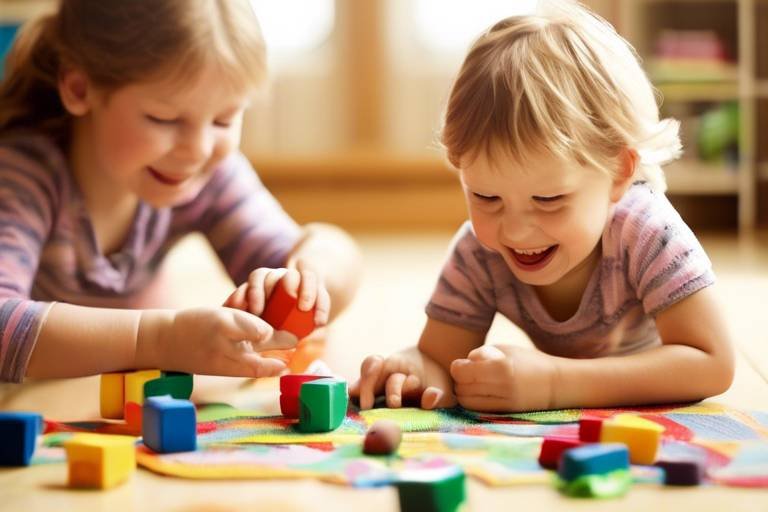Boosting Self-Confidence in Kids
Self-confidence in children is like a sturdy tree that grows strong and tall with the right nurturing. When kids believe in themselves, they are more likely to face challenges head-on, explore new opportunities, and develop a positive self-image. In today's fast-paced world, where pressures and expectations can weigh heavily on young minds, it is crucial for parents and educators to foster an environment that encourages self-assurance. After all, a confident child is not just more resilient but also more adaptable, creative, and willing to embrace life's adventures.
So, how can we help our children cultivate this essential trait? The journey to boosting self-confidence is not a one-size-fits-all approach; it requires understanding, patience, and a sprinkle of creativity. From celebrating small victories to providing opportunities for independence, there are numerous strategies that can empower children to believe in their abilities. Let's dive deeper into the importance of self-confidence and explore effective techniques that can make a significant difference in a child's life.
Understanding why self-confidence is crucial for children's development can help parents and educators implement effective strategies that nurture a healthy sense of self-worth and encourage personal growth. Self-confidence acts as the foundation for many aspects of a child's life, including academic performance, social interactions, and emotional well-being. When children feel good about themselves, they are more likely to take risks, express their thoughts, and pursue their interests.
Imagine self-confidence as a superhero cape; when children wear it, they feel invincible! They are more willing to tackle challenges, whether it's speaking up in class or trying out for a sports team. This sense of assurance not only enhances their performance but also cultivates a growth mindset, allowing them to learn from failures rather than fear them. The ripple effects of self-confidence extend far beyond childhood, shaping how individuals approach challenges throughout their lives.
Utilizing positive reinforcement can significantly boost a child's self-esteem. This section discusses various methods to encourage and acknowledge children's efforts, fostering a supportive environment for growth. When children receive recognition for their hard work, it sends a powerful message: their efforts matter. This acknowledgment can come in many forms, such as verbal praise, rewards, or even simple gestures of appreciation that show kids their contributions are valued.
The power of verbal praise cannot be underestimated. Specific, genuine compliments can enhance a child's self-image and motivate them to take on new challenges. Instead of generic remarks like "Good job," try to be more specific. For instance, saying "I love how you worked so hard on your project; your creativity really shines through!" can make a world of difference. This targeted praise not only boosts their confidence but also reinforces the behaviors you want to encourage.
Focusing on effort rather than outcomes helps children understand that trying hard is valuable. This approach nurtures resilience and a growth mindset, essential for building self-confidence. When kids know that their effort is what truly counts, they become more willing to take risks, knowing that it's okay to stumble along the way. This mindset fosters a love for learning and an appreciation for the journey rather than just the destination.
Recognizing even minor accomplishments can significantly uplift a child's spirit. Celebrating small wins, such as completing homework on time or mastering a new skill, reinforces their belief in their abilities. It’s like throwing a mini party for every little victory! These celebrations can be as simple as a high-five, a sticker chart, or a special treat. Each acknowledgment builds on their confidence, creating a positive feedback loop that encourages further effort.
A nurturing and supportive environment is vital for building self-confidence in kids. Parents and caregivers play a crucial role in creating a safe space where children feel comfortable expressing themselves. This means fostering open communication and being receptive to their thoughts and feelings. When children know they can share their concerns without fear of judgment, they are more likely to develop a healthy self-image.
Additionally, surrounding children with positive role models—whether it's family members, teachers, or community figures—can significantly impact their self-esteem. These role models can provide guidance, share their own experiences of overcoming challenges, and inspire kids to believe in their potential. Ultimately, a supportive environment lays the groundwork for children to flourish and develop the self-confidence they need to navigate life's complexities.
Q: How can I tell if my child is lacking self-confidence?
A: Signs of low self-confidence in children may include reluctance to try new things, excessive self-criticism, withdrawal from social situations, and a fear of failure. Observing their behavior and listening to their self-talk can provide valuable insights.
Q: What are some quick activities to boost my child's confidence?
A: Simple activities like creating a "brag book" where kids can showcase their achievements, or engaging in role-playing scenarios can help boost their confidence. Additionally, encouraging them to participate in group activities can provide a sense of belonging and accomplishment.
Q: Is it ever too late to build self-confidence in kids?
A: No, it's never too late! While early interventions can be beneficial, children of all ages can develop self-confidence through positive reinforcement, supportive environments, and opportunities for independence.

The Importance of Self-Confidence
Understanding why self-confidence is crucial for children's development can help parents and educators implement effective strategies that nurture a healthy sense of self-worth and encourage personal growth. Self-confidence serves as the foundation upon which children build their aspirations, tackle challenges, and develop resilience. When kids believe in themselves, they are more likely to engage in new activities, take risks, and embrace opportunities for learning. It's like giving them a sturdy pair of wings; they can soar to new heights, explore their potential, and face the world with a positive mindset.
Moreover, self-confidence plays a vital role in a child's emotional and social development. Children who possess a healthy level of self-assurance are often better equipped to handle peer relationships and navigate social situations. They tend to be more outgoing, willing to express their thoughts and feelings, and less likely to succumb to peer pressure. Think of it as a social compass; self-confidence helps kids steer through the complexities of friendships and interactions, allowing them to forge meaningful connections.
Additionally, the impact of self-confidence extends beyond childhood. The skills and attitudes developed during these formative years can influence a child's future academic performance, career choices, and overall life satisfaction. Children who grow up with a strong sense of self are more likely to pursue their passions, set ambitious goals, and persist in the face of obstacles. It's a ripple effect that can lead to lifelong success and happiness.
To illustrate the significance of self-confidence, consider the following table that highlights some key benefits:
| Benefit | Description |
|---|---|
| Improved Academic Performance | Confident children are more willing to participate in class, ask questions, and seek help when needed. |
| Resilience | They are better equipped to handle setbacks and view challenges as opportunities for growth. |
| Stronger Relationships | Self-assured kids tend to build healthier friendships and communicate more effectively. |
| Goal Setting | They are more likely to set and pursue personal and academic goals, leading to greater achievements. |
In summary, fostering self-confidence in children is not just about boosting their self-esteem; it's about equipping them with the tools they need to navigate life successfully. Encouraging a positive self-image can lead to a brighter future, filled with opportunities and personal growth. So, how can we, as parents and caregivers, instill this crucial quality in our children? Let's explore some practical strategies in the following sections.

Positive Reinforcement Techniques
When it comes to boosting self-confidence in kids, positive reinforcement plays a pivotal role. It’s like watering a plant; the more you nurture it, the more it thrives. By acknowledging and rewarding a child's efforts, parents and educators can create a fertile ground for self-esteem to grow. This section dives into various methods that can help you encourage and recognize children's efforts, paving the way for a supportive environment that fosters growth.
The power of verbal praise cannot be underestimated. Think about how good it feels to hear someone say, "Great job!" or "I’m proud of you!" These simple affirmations can light up a child’s face and significantly enhance their self-image. Specifically, when praise is specific and genuine, it becomes even more effective. Instead of a generic "Good job," try saying, "You did an amazing job organizing your toys; I love how you sorted them by color!" This not only boosts their confidence but also reinforces the behavior you want to see more of.
One of the most effective techniques in positive reinforcement is focusing on effort rather than outcomes. Imagine a child who tries hard to solve a tough math problem but doesn't get the right answer. Instead of emphasizing the incorrect result, praise their effort: "I can see you worked really hard on that! Keep trying, and you'll get it!" This approach helps children understand that trying hard is valuable and nurtures resilience. It cultivates a growth mindset, where they learn to embrace challenges and view failures as stepping stones to success.
Recognizing even minor accomplishments can significantly uplift a child's spirit. It’s like throwing a mini-party for every little victory! Whether it’s finishing a book, tying their shoes, or helping set the table, these small wins deserve acknowledgment. Celebrating these achievements helps children feel a sense of accomplishment and boosts their self-worth. You can create a simple chart where kids can track their accomplishments, adding stickers for each achievement. This visual representation can serve as a daily reminder of their capabilities.
A nurturing and supportive environment is vital for building self-confidence in kids. When children feel safe to express themselves without fear of judgment, they are more likely to take risks and try new things. Parents and caregivers can cultivate this safe space by actively listening to their children, validating their feelings, and encouraging open communication. For instance, when a child shares a concern or a new idea, responding with enthusiasm and interest can make them feel valued and understood.
In conclusion, utilizing positive reinforcement techniques is essential for nurturing a child's self-confidence. By focusing on verbal praise, encouraging effort, celebrating small achievements, and creating a supportive environment, we can help children develop a healthy sense of self-worth. Remember, every little bit of encouragement adds up, and before you know it, your child will be ready to take on the world with confidence!
- What is positive reinforcement?
Positive reinforcement involves rewarding desired behaviors to encourage their repetition, fostering a supportive and motivating environment for children. - How can I effectively praise my child?
Be specific in your praise, focusing on the effort and process rather than just the outcome. This helps children understand what behaviors to continue. - Why is celebrating small achievements important?
Celebrating small wins boosts children's self-esteem and motivates them to take on bigger challenges, reinforcing their sense of accomplishment. - How can I create a supportive environment for my child?
Encourage open communication, actively listen to your child, and validate their feelings to create a safe space where they can express themselves.

Verbal Praise
is one of the most powerful tools in a parent or educator's toolkit when it comes to enhancing a child's self-confidence. Think about it: when a child hears positive words about their efforts or achievements, it’s like giving them a little boost of energy. This boost can transform their perspective on challenges, making them feel more capable and willing to step outside their comfort zone. But it’s not just about saying “good job!”; the magic lies in the specifics.
When providing verbal praise, it’s essential to be genuine and specific. Instead of generic compliments, focus on what the child did well. For instance, saying “I love how you worked hard on your project and didn’t give up when it got tough” not only acknowledges their effort but also reinforces the value of perseverance. This kind of feedback helps children understand that their hard work is recognized, and it encourages them to continue putting in effort in the future.
Moreover, verbal praise should be timely. It’s most effective when given right after the child has accomplished something. This immediate acknowledgment allows them to connect their action with the positive feedback. Imagine a child who just completed a challenging puzzle; if you say, “Wow! You figured that out all by yourself! I’m so proud of you!” it reinforces their belief in their problem-solving skills. It’s like planting a seed of confidence that can grow over time.
Another key aspect of verbal praise is to focus on effort rather than innate ability. When children hear that they are “smart” or “talented,” they might feel pressured to maintain that image. Instead, praising their efforts encourages a growth mindset, where they learn that persistence and hard work are what truly lead to success. For example, saying, “I can see you practiced a lot for that performance, and it really showed!” emphasizes the value of effort, which is crucial for building resilience.
To sum it up, verbal praise is not just a pat on the back; it’s a vital component in nurturing a child’s self-esteem. By being specific, timely, and effort-focused, parents and educators can create a positive feedback loop that encourages children to take on challenges with confidence. And remember, the more you celebrate their efforts, the more they will believe in their abilities, paving the way for a bright and resilient future.
- How often should I give verbal praise to my child? - It's best to give verbal praise regularly, especially when you notice effort or improvement. However, balance is key; too much praise can lead to dependency.
- Can verbal praise have negative effects? - Yes, if it’s overdone or if it focuses too much on innate ability rather than effort, it can create pressure. Aim for genuine and specific praise.
- What if my child seems indifferent to praise? - Some children may be more reserved. Try to understand their personality and adjust your approach. Sometimes, a quiet acknowledgment can be just as powerful.

Encouraging Effort Over Results
When it comes to nurturing self-confidence in children, one of the most powerful strategies is to focus on their efforts rather than just the outcomes. Imagine a young artist who creates a beautiful painting; instead of merely praising the final product, we should celebrate the time, creativity, and hard work that went into it. This approach not only fosters a love for the process but also instills a sense of resilience in children, teaching them that effort is valuable in its own right.
Children often feel pressure to achieve specific results, whether it's getting the highest grades in school or winning a sports competition. By shifting the focus to effort, we help them understand that success is not just about winning but also about learning and growing through challenges. For instance, when a child struggles with a math problem, instead of solely acknowledging the correct answer, we can highlight their determination to solve it. This can be done through phrases like, "I’m so proud of how hard you worked on that problem!" Such verbal affirmations can have a profound impact on their self-image.
Moreover, it's essential to recognize that every child has their own pace and style of learning. By encouraging them to embrace their unique journey, we cultivate a growth mindset. This means they will not shy away from challenges but will see them as opportunities to learn and improve. For example, a child who enjoys playing soccer but isn't the best player yet can be motivated by the progress they make during practice sessions. Celebrating their dedication and willingness to improve reinforces their self-worth and encourages them to keep trying, even when they face setbacks.
In addition to verbal praise, creating an environment where children feel safe to express their attempts is crucial. This can be achieved by establishing a culture of support and encouragement. Parents and educators can facilitate this by sharing their own experiences with effort versus results. For instance, discussing times when they faced challenges but persevered can serve as a relatable example for children. When kids see that even adults encounter difficulties and that effort is what leads to eventual success, they are more likely to internalize this lesson.
Remember, the goal is to cultivate a mindset that values the journey of learning. When children understand that effort is the cornerstone of achievement, they will be more inclined to embrace challenges rather than fear them. This shift in perspective can lead to a lifetime of resilience and confidence, equipping them with the tools they need to navigate life’s ups and downs.

Celebrating Small Achievements
When it comes to nurturing a child's self-confidence, can be a game-changer. Imagine a child who just tied their shoelaces for the first time. Instead of brushing it off as a trivial task, acknowledging this moment can create a ripple effect of positivity. By celebrating these little victories, we send a message that every step forward counts, no matter how small it may seem.
Children thrive on recognition. It’s like watering a plant; without it, growth is stunted. When we celebrate small achievements, we’re essentially saying, "Hey, look at what you did! That’s awesome!" This affirmation can boost their self-esteem and motivate them to tackle more challenging tasks. Whether it’s mastering a new skill, completing a homework assignment, or simply being kind to a friend, these moments deserve a spotlight.
So, how can we effectively celebrate these small wins? Here are a few ideas:
- Verbal Acknowledgment: A simple "Great job!" or "I’m so proud of you!" can go a long way in making a child feel valued.
- Special Rewards: Consider implementing a reward system, where kids can earn stickers or tokens for their achievements, which they can later exchange for a fun activity.
- Family Celebrations: Make it a tradition to share and celebrate each other's small wins during family dinners. This not only boosts confidence but also strengthens family bonds.
Furthermore, it’s essential to tailor the celebration to the child’s personality. Some kids might enjoy a big celebration, while others may prefer a quiet acknowledgment. It’s about understanding what resonates with them. By doing so, we create an environment where they feel safe to explore and take risks.
Celebrating small achievements is not just about the moment; it’s about building a foundation of resilience. When children see that their efforts are recognized, they are more likely to take on new challenges with enthusiasm. They learn that failure is not the opposite of success but a part of the journey. This perspective is crucial as they navigate through life’s ups and downs.
In conclusion, recognizing and celebrating small achievements is a powerful tool in building a child’s self-confidence. It helps them develop a positive self-image and encourages them to embrace challenges. So, the next time your child accomplishes something, no matter how minor it may seem, take a moment to celebrate. You’re not just acknowledging their success; you’re helping to shape a confident and resilient individual.
Q: Why is celebrating small achievements important for children?
A: Celebrating small achievements helps children build self-esteem, fosters a positive self-image, and encourages them to take on new challenges.
Q: How can I celebrate my child's achievements without overdoing it?
A: Simple verbal praise or small rewards can be effective. Tailor the celebration to your child's personality and preferences to ensure it feels genuine.
Q: What are some examples of small achievements I can celebrate?
A: Small achievements can include completing homework, learning a new skill, being kind to a friend, or even trying something new.
Q: How often should I celebrate my child's achievements?
A: Celebrate regularly! Frequent acknowledgment helps reinforce positive behavior and encourages children to continue striving for success.

Creating a Supportive Environment
Creating a supportive environment for children is like building a sturdy foundation for a house; without it, everything else is at risk of collapsing. When kids feel safe, accepted, and valued, they are more likely to take risks, express their thoughts, and embrace challenges. So, how can parents and caregivers create such an environment? It starts with open communication. Encourage your child to share their feelings and thoughts without fear of judgment. This can be as simple as asking them about their day or discussing their favorite activities. When children know they can talk to you about anything, they feel empowered and confident.
Moreover, it's essential to show unconditional love and support. Children need to understand that they are valued for who they are, not just for their achievements. This can be demonstrated through simple gestures like hugs, words of affirmation, or spending quality time together. For example, when your child tries something new, whether it’s a school project or a new sport, let them know that you’re proud of their effort regardless of the outcome. This reinforces the idea that their worth is not tied to success but rather to their willingness to try.
Another vital aspect of creating a supportive environment is to establish clear boundaries and expectations. Children thrive when they know what is expected of them. Setting rules and guidelines helps them feel secure and understand the consequences of their actions. However, it’s equally important to involve them in this process. Ask for their input on rules, and explain the reasons behind them. This not only promotes understanding but also fosters a sense of responsibility and ownership over their behavior.
Additionally, consider incorporating positive reinforcement into your interactions. Recognizing and rewarding good behavior or effort can significantly boost a child's self-esteem. For instance, if your child completes their homework on time, praise their diligence and commitment. This not only encourages them to continue putting in effort but also reinforces the idea that hard work leads to positive outcomes.
Finally, make sure to create a space where your child can explore their interests and passions. Whether it’s through arts, sports, or academics, providing them with opportunities to discover what they love will help them build confidence. You might even set up a small area in your home dedicated to their hobbies, filled with supplies and resources. When children engage in activities they are passionate about, they naturally develop a stronger sense of self.
In conclusion, a supportive environment is crucial for nurturing self-confidence in children. By fostering open communication, showing unconditional love, establishing clear boundaries, using positive reinforcement, and encouraging exploration, you can create a space where your child feels safe to grow and thrive. Remember, the goal is not to create a perfect child but a confident one who is ready to face the world with resilience and courage.
- How can I encourage my child to express their feelings? Start by modeling open communication yourself. Share your feelings and ask open-ended questions to prompt discussions.
- What are some effective ways to show unconditional love? Simple gestures like hugs, compliments, and spending quality time together can convey your love effectively.
- How do I set appropriate boundaries for my child? Discuss rules together, explaining their importance, and be consistent in enforcing them.
- What types of positive reinforcement work best? Tailor your praise to be specific and genuine, focusing on effort and improvement rather than just results.
- How can I help my child find their interests? Expose them to various activities and encourage them to try new things without pressure.

Encouraging Independence
Fostering independence in children is not just about giving them the freedom to make choices; it's about equipping them with the skills they need to navigate the world confidently. When kids learn to take charge of their own decisions, they develop a sense of ownership over their actions and outcomes. This is crucial for building self-confidence, as it helps them realize that they are capable of handling challenges on their own. Think of it like teaching a child to ride a bike; at first, they might wobble and fall, but with practice and encouragement, they eventually find their balance and can ride confidently without assistance.
One effective way to encourage independence is by assigning age-appropriate responsibilities. This can range from simple tasks like making their bed or helping set the table, to more complex responsibilities such as managing their homework schedule or organizing their school supplies. When children are entrusted with these tasks, they feel valued and capable, which boosts their self-esteem. For instance, a child who is responsible for packing their own lunch not only learns about nutrition but also gains a sense of accomplishment when they successfully prepare their meal.
Moreover, giving children opportunities to make decisions—big or small—can significantly enhance their confidence. Allowing them to choose their outfits, select extracurricular activities, or even decide on family meals encourages them to think critically about their preferences and develop a sense of agency. It's essential, however, to strike a balance. While it's beneficial to let kids make choices, they also need guidance to ensure that their decisions are informed and appropriate. This process can be likened to planting a seed; with proper care and nurturing, it will grow into a strong, independent plant.
As parents and caregivers, it’s vital to create an environment where children feel safe to express themselves and make mistakes. Mistakes are a natural part of learning and should be viewed as opportunities for growth rather than failures. When children know they have the support of their parents, they are more likely to take risks and step out of their comfort zones. This could mean trying out for a sports team, auditioning for a school play, or simply speaking up in class. Each of these experiences contributes to their overall self-confidence and prepares them for future challenges.
In conclusion, encouraging independence in children is a multifaceted approach that involves assigning responsibilities, allowing decision-making, and creating a supportive environment. By nurturing these qualities, we empower our children to become confident individuals who are ready to embrace life's challenges head-on. Remember, the journey to independence is a gradual process, and every small step counts towards building their self-esteem.
- Why is independence important for children's self-confidence?
Independence allows children to make choices and take responsibility for their actions, which fosters a sense of capability and self-worth. - How can I start encouraging my child to be more independent?
Begin by assigning age-appropriate tasks and gradually increase their responsibilities as they grow more confident. - What if my child struggles with making decisions?
Provide guidance and support, but allow them to make choices to build their confidence. Discuss the outcomes together to help them learn. - Are there specific activities that promote independence?
Activities such as cooking, managing a small allowance, or participating in team sports can greatly enhance a child's sense of independence.

Age-Appropriate Responsibilities
Assigning to children is like planting seeds in a garden—each task nurtures their growth and helps them flourish into confident individuals. When children are given small, manageable tasks that suit their age and abilities, they begin to feel a sense of accomplishment and ownership. This is crucial for building their self-esteem and independence. For instance, a five-year-old might be tasked with putting away their toys, while a ten-year-old could help with setting the dinner table or folding laundry. These small chores not only teach them valuable life skills but also instill a sense of responsibility and pride in their capabilities.
As children tackle these tasks, they learn to navigate challenges and develop problem-solving skills. Think of it as giving them a mini-project; when they complete it, they gain confidence in their ability to handle more complex tasks in the future. For example, when a child successfully helps prepare a simple meal, they not only feel accomplished but also realize that they can contribute to the family. This experience reinforces their belief in their abilities, making them more willing to take on new challenges.
Here’s a quick overview of some age-appropriate responsibilities that can be assigned to children:
| Age Group | Suggested Responsibilities |
|---|---|
| 2-4 years | Picking up toys, putting dirty clothes in the hamper |
| 5-7 years | Setting the table, helping with simple meal prep |
| 8-10 years | Doing laundry, cleaning their room |
| 11-13 years | Cooking simple meals, managing their homework schedule |
It's essential, however, to remember that the goal is not to overwhelm them but to empower them. By gradually increasing the complexity of the tasks as they grow, you can help them build confidence at each stage. Encouragement is key; when they complete a task, celebrate their success with praise. This positive reinforcement will make them more eager to take on new responsibilities in the future.
Furthermore, it’s important to involve children in the process of selecting their responsibilities. Asking them what they would like to do can make them feel more invested and excited about their tasks. It’s like giving them a say in their own adventure—who wouldn’t want that? This fosters not only their independence but also their decision-making skills, which are invaluable as they grow. Remember, the journey of building self-confidence through responsibilities is a marathon, not a sprint. Each step they take builds towards a more confident and self-assured individual.
- What age should I start giving my child responsibilities? It's beneficial to start as early as two years old with simple tasks like picking up toys.
- How can I encourage my child to take on more responsibilities? Offer praise and celebrate their accomplishments, no matter how small, to motivate them.
- What if my child resists taking on responsibilities? Try to involve them in the decision-making process and discuss the importance of contributing to the family.
- Can too many responsibilities harm my child's self-esteem? Yes, it's crucial to match responsibilities to their age and abilities to prevent overwhelm.

Decision-Making Opportunities
Allowing children to make choices is a **powerful** way to foster their self-confidence. When kids are given the chance to decide, whether it's what to wear in the morning or how to spend their weekend, they begin to understand their own preferences and opinions. This practice not only boosts their self-esteem but also nurtures critical thinking. Imagine a child standing in front of a wardrobe full of clothes; the simple act of choosing an outfit becomes a mini exercise in autonomy. It’s like giving them the keys to their own kingdom, where every choice they make contributes to their sense of self.
Moreover, decision-making opportunities can be structured in various ways to suit different age groups. For younger children, choices can be as simple as selecting between two snacks or choosing a book to read. For older kids, the options can expand to include deciding on extracurricular activities or even contributing to family plans. This gradual increase in responsibility teaches them that their choices matter and that they can have a say in their lives. It’s important to remember that even small decisions can have a **big impact** on a child’s confidence.
In addition to enhancing confidence, making decisions helps children learn from their experiences. When they face the consequences of their choices—whether positive or negative—they develop resilience. For instance, if a child chooses to play outside instead of finishing their homework and later realizes they have less time to complete it, they learn the importance of balancing fun and responsibilities. This process is akin to a **trial and error** method, where each decision becomes a stepping stone toward greater self-awareness and maturity.
To further illustrate the significance of decision-making opportunities, consider the following table that outlines various decision-making activities suitable for different age groups:
| Age Group | Decision-Making Activity | Benefits |
|---|---|---|
| 3-5 years | Choosing between two snacks | Encourages autonomy and preference recognition |
| 6-8 years | Selecting a book for bedtime | Boosts confidence in personal choices |
| 9-12 years | Deciding on a weekend activity | Fosters planning skills and responsibility |
| 13+ years | Choosing extracurricular activities | Enhances independence and self-advocacy |
As parents and caregivers, it’s essential to create an environment where children feel safe to express their choices. This means respecting their decisions, even if they differ from what you might choose. When children see that their opinions are valued, it reinforces their self-worth and encourages them to continue making decisions confidently. It's like planting a seed of confidence that can grow into a strong, resilient tree over time.
In conclusion, providing decision-making opportunities is a fundamental aspect of nurturing self-confidence in children. By allowing them to make choices, you’re not just giving them the freedom to express themselves; you’re equipping them with the skills they need to navigate life’s challenges. So next time your child asks, "Can I pick what we have for dinner tonight?" consider saying yes. You might be surprised at how much this simple act can empower them!
- Why is decision-making important for children? Decision-making helps children develop critical thinking skills and boosts their self-confidence by allowing them to take ownership of their choices.
- How can I encourage my child to make decisions? Start with small choices, like selecting snacks or activities, and gradually introduce more significant decisions as they grow.
- What if my child makes a poor decision? Use it as a teaching moment. Discuss what went wrong and how they can approach similar situations differently in the future.
- At what age should I start letting my child make decisions? You can begin allowing children to make simple choices as early as age 3, gradually increasing the complexity of decisions as they mature.
Frequently Asked Questions
- Why is self-confidence important for children?
Self-confidence is crucial for children's development as it shapes their self-image and influences their willingness to take on challenges. When kids believe in themselves, they are more likely to try new things, learn from their mistakes, and develop resilience. This foundational belief in their abilities sets the stage for future success in school and life.
- How can I use positive reinforcement to boost my child's confidence?
Positive reinforcement can be incredibly effective in boosting a child's self-esteem. You can use verbal praise to acknowledge their efforts, celebrate small achievements, and focus on the process rather than just the results. By creating a supportive environment where your child feels valued for their hard work, you help them build a stronger sense of self-worth.
- What are some age-appropriate responsibilities I can assign to my child?
Age-appropriate responsibilities can vary, but some great examples include simple chores like making their bed, helping with meal preparation, or taking care of a pet. These tasks not only make children feel capable but also encourage them to take ownership of their actions, which is vital for building self-confidence.
- How can I encourage my child to make decisions?
Encouraging decision-making can be as simple as allowing your child to choose their outfit for the day or what snack they want after school. By providing opportunities for them to make choices, you help them develop critical thinking skills and empower them to trust their judgment, which boosts their confidence.
- What role does celebrating small achievements play in building self-confidence?
Celebrating small achievements is essential because it reinforces the idea that every effort counts. When children see that their hard work is recognized, even if the results are minor, it uplifts their spirit and motivates them to keep trying. This practice fosters a sense of accomplishment and encourages a growth mindset.
- How can I create a supportive environment for my child?
Creating a supportive environment involves being present, listening actively, and encouraging open communication. Make sure your child knows they can express their feelings without judgment. Provide them with a safe space to explore their interests and reassure them that it's okay to make mistakes—this cultivates a nurturing atmosphere where self-confidence can thrive.



















